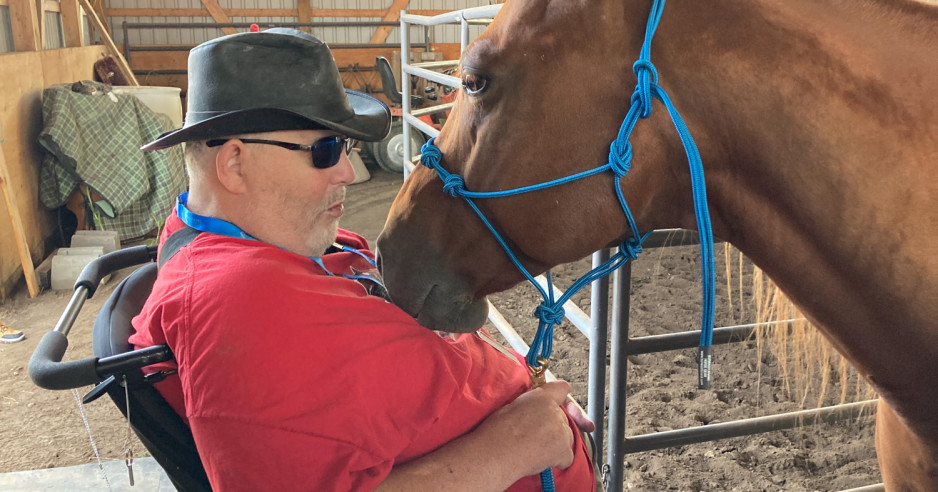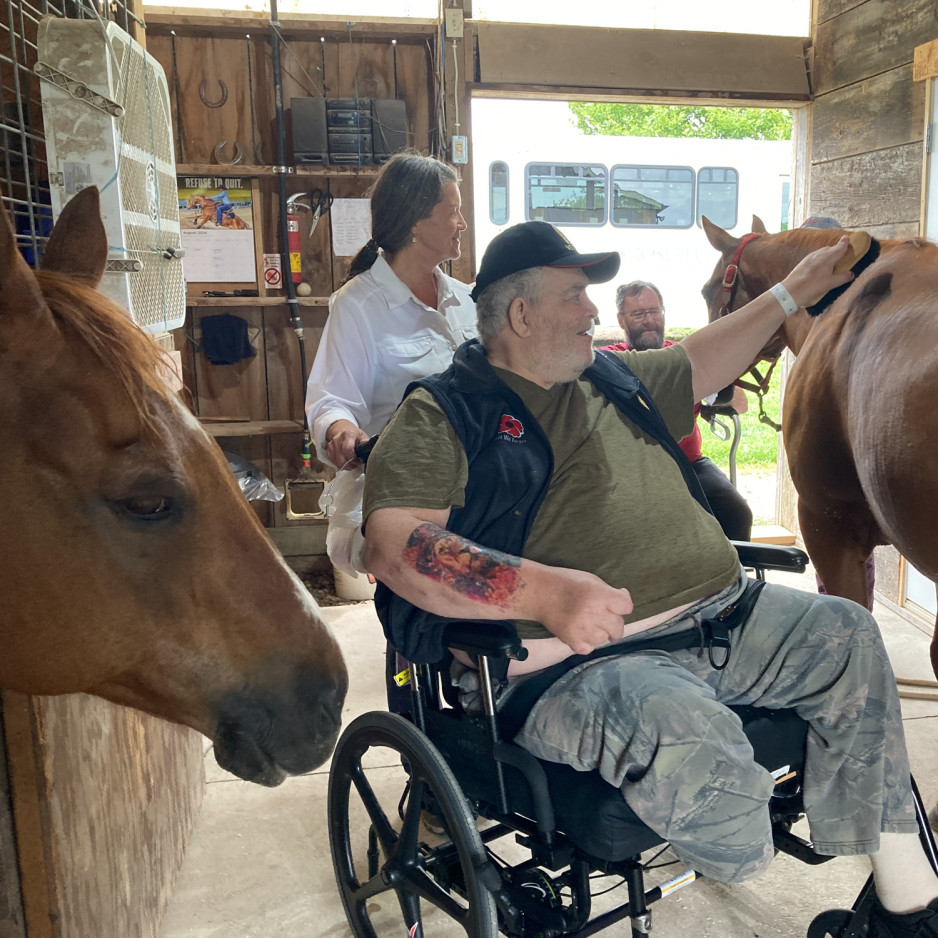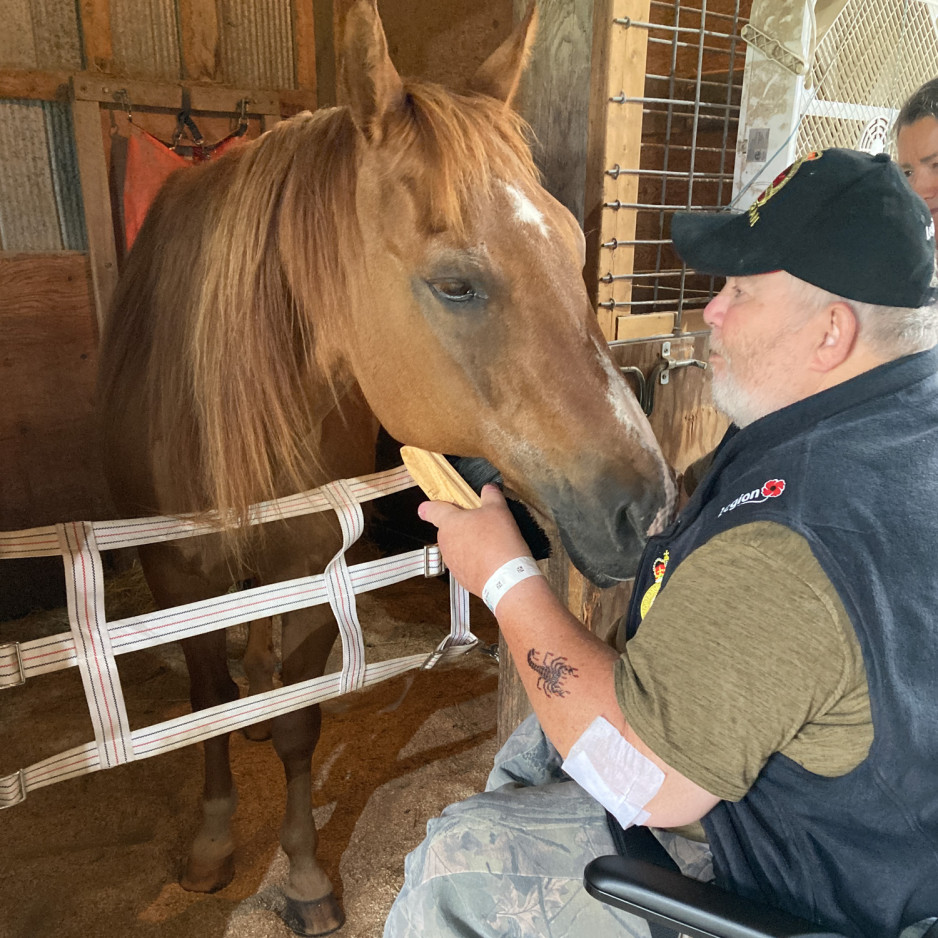A breath of fresh air
“Seeing the horses is glorious,” says Andy Waldron, a resident in St. Joseph’s Veterans Care Program.
He’s talking about the horses he is connecting with as part of the Facilitated Equine Experiential Learning (FEEL) Program. Waldron is one of six veterans participating in the pilot FEEL Program, which has been generously funded by donations made through St. Joseph’s Health Care Foundation.
Waldron says that as soon as he met his horse Cookie, they made an instant connection.
“Every time I see her, she gives me a kiss. I think it helps that I feed her apples,” he adds with a chuckle.
The FEEL Program is the brainchild of Marie Finkbeiner, a Therapeutic Recreation Specialist in the Veterans Care Program.
She was exploring new experiences that could benefit younger veterans in the program, particularly those with a range of mental health diagnoses and a history of perceived or experienced trauma. Finkbeiner was personally familiar with equine therapy and its success in giving people a sense of peace and belonging. Interacting with horses is helpful in reducing symptoms of anxiety and depression, while empowering individuals with an enhanced sense of self-efficacy and well-being.
With some research in hand, Finkbeiner reached out to her colleagues Sandy Harle, Certified Spiritual Care Practitioner, and Kelly Robertson, Social Worker, to gain their insights and build a plan for a new therapeutic program.
“I immediately saw the link between spirituality and healing when Marie told me about the program,” says Harle.
After several months of planning, Harle or Robertson and two veterans boarded the Veterans Bus –with Finkbeiner in the driver’s seat – and travelled out to Glencoe for their first visit to Hathaway Farms.
By keeping the numbers in the sessions to two, the care team was able to focus on the individual needs of the veterans and allow them a little more freedom to open up. It also allowed for some of the conversations and reflections that emerged during the session to continue.
The FEEL program made an impact right away on the veterans. Since then, the group has been back several times to see their favourite horses.
During each of the 90-minute sessions, the veterans are invited to take part in mindfulness exercises or meditation. They might also explore and talk about the emotions they are experiencing in the moment or overall. Once the horses are brought out, they learn more about the benefits of equine therapy – and there’s lots of interaction, from brushing and feeding the horses to many hugs and kisses. Throughout each session the veterans are well supported by Finkbeiner, Harle, Robertson and the equine therapy team from Hathaway.
For Waldron, who has experience with horses, the sessions are about making a connection and having a way to let go of the stress and frustration in his life. A self-described shy person, Waldron says the horses have helped him to come out of his shell.
“I’ve developed a harmonious relationship with Cookie,” says Waldron. “Every time I visit her, I feel relaxed and peaceful. I wish I could go more often.”
Waldron is not alone in his enthusiasm. To date, all the participants have rated the program very highly and expressed their interest in continuing with it. Program evaluation was important to the care team, who shared that it’s often completed right away, on the bus ride back from the farm. And Harle says that they have seen progression in what the veterans share about their experience including what they have learned about themselves and their own wellbeing.
“They often talk about feeling more peaceful and describe positive and non-judgmental feelings of acceptance, a centering of oneself and a heightened sense of connection,” Harle added.
Some have even described it as a breath of fresh air.
“The needs of veterans are complex and can come with many layers,” says Finkbeiner. “And the needs of our younger population are unique, so we were so pleased to be able to identify a program that could provide them with more of their own agency and that could really support them.”
The planning trio now hopes to graduate the pilot into a formal program, which is moving forward thanks to a donation from General Dynamics Land Systems-Canada. Meanwhile, they are also looking for ways to maintain the connection between the veterans and the horses during the winter months.
“There’s been an alchemy of things working together to offer a safe experience for veterans,” says Harle. “I feel a real sense of excitement that we have found a program that will be hugely beneficial to the wellbeing of our residents.”
Your Donation Matters Here
Your gift will help keep our facilities up-to-date for patients and their families.



